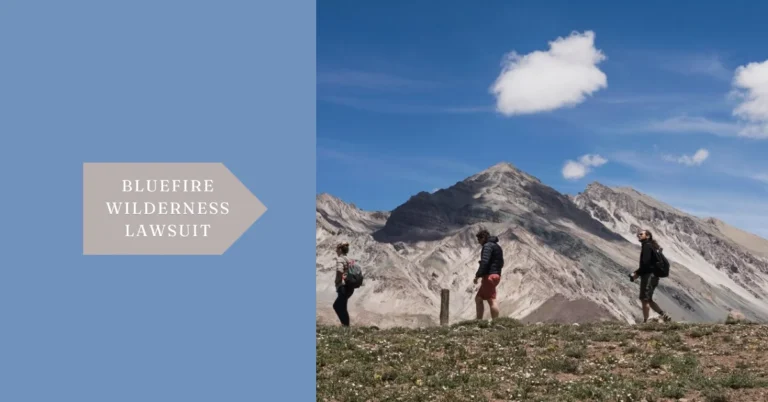Introduction to BlueFire Wilderness
Adventure therapy has emerged as a transformative way to help individuals reconnect with themselves and the world around them. BlueFire Wilderness stands at the forefront of this movement, offering immersive experiences designed to foster personal growth and healing through nature. However, recent events have cast a shadow over its reputation. The BlueFire Wilderness lawsuit has raised questions about ethical practices in adventure therapy programs.
As we delve into the details of this lawsuit, we’ll explore both its implications for participants seeking support and how it impacts the broader industry. Join us as we navigate these complex waters while highlighting the critical need for integrity in therapeutic practices.
The Purpose and Philosophy of Adventure Therapy
Adventure therapy merges the great outdoors with therapeutic practices. It is designed to help individuals confront challenges in a supportive environment.
Through physical activities, participants engage not just with nature but also with themselves. This process fosters personal growth and emotional healing. The philosophy centers on experiential learning—understanding oneself through action rather than traditional talk therapy.
Nature acts as both a backdrop and a catalyst for change. Participants often find clarity among serene landscapes, which encourages self-reflection and connection to their inner thoughts.
The adventures are tailored to each individual’s needs, promoting teamwork, resilience, and coping strategies. As clients navigate the wilderness together, they build trust while developing essential life skills.
This holistic approach recognizes that healing can occur outside conventional settings. Adventure therapy offers a fresh perspective on mental health treatment by blending exploration with emotional support.
Overview of the Lawsuit Against BlueFire Wilderness
The BlueFire Wilderness lawsuit has garnered significant attention in recent months. Families have raised concerns regarding the treatment and safety of their loved ones while participating in the program.
Legal documents highlight allegations that suggest a failure to provide adequate supervision and care. Some former participants recount distressing experiences, claiming they were subjected to harsh conditions without proper support.
Reports indicate that these claims assert not only emotional distress but also physical harm sustained during various activities. The plaintiffs argue that such practices deviate from established standards for adventure therapy programs.
As cases like this unfold, they shine a spotlight on the need for accountability within therapeutic settings. This situation raises questions about industry regulations and ethical responsibilities among providers.
Allegations Against the Program
Allegations against BlueFire Wilderness have raised serious concerns regarding their practices. Accusations include claims of inadequate supervision during therapy sessions. Parents and former participants have reported unsafe environments, which they argue compromise the therapeutic experience.
Some individuals allege that staff members were untrained or ill-equipped to handle crises effectively. These claims suggest a lack of proper support for vulnerable youth in high-stress situations.
Moreover, reports describe instances where methods employed by the program appeared overly harsh or punitive rather than supportive. Critics argue this contradicts the fundamental principles of adventure therapy, which emphasize trust and personal growth.
These allegations have sparked intense debate within the community about safety standards and ethical considerations in treatment programs like BlueFire Wilderness. The implications extend beyond just one organization; the entire industry faces scrutiny as it grapples with these challenging issues.
Response from BlueFire Wilderness
BlueFire Wilderness has publicly addressed the recent allegations surrounding its program. They have emphasized their commitment to providing a safe and supportive environment for all participants. The organization believes in the transformative power of adventure therapy.
In their response, BlueFire highlighted their rigorous training protocols for staff. They asserted that these measures are designed to ensure both safety and efficacy in therapeutic practices. This dedication is pivotal in maintaining trust with families seeking help.
Furthermore, they expressed deep concern about how these allegations could impact those benefiting from their services. BlueFire remains steadfast in its mission to support troubled youth through experiential learning and emotional growth.
The organization invites open dialogue regarding concerns while reinforcing the importance of ethical standards within the industry. Their focus continues to be on delivering quality care amidst challenges, showcasing resilience against criticism aimed at altering perceptions of adventure therapy as a whole.
Impact on the Industry of Adventure Therapy
The lawsuit against BlueFire Wilderness has sent ripples through the adventure therapy community. It highlights the need for greater accountability and transparency in therapeutic practices.
As awareness grows, programs may face increased scrutiny from parents and regulatory bodies. This could lead to stricter guidelines that ensure safety and ethical treatment of participants.
Moreover, potential clients might become more cautious when selecting a program. They will likely seek out providers with a proven track record of positive outcomes.
This situation could foster an environment where only those committed to best practices thrive. Innovation in methods and training will be essential for programs looking to differentiate themselves amidst heightened concerns.
This case underscores the importance of maintaining high standards across the industry, ensuring that adventure therapy remains a legitimate avenue for healing rather than becoming mired in controversy.
Conclusion: The Importance of Ethical Practices in Therapy Programs
The recent BlueFire Wilderness lawsuit has sparked intense discussions about the ethics and practices within adventure therapy programs. As this case unfolds, it serves as a critical reminder of the need for ethical standards in all therapeutic settings.
Adventure therapy can be a transformative experience for many individuals seeking healing through nature and physical challenges. However, when allegations arise that question the safety and effectiveness of such programs, it raises alarm bells across the industry. Providers must prioritize their clients’ well-being above all else.
Addressing these issues head-on is essential for maintaining trust with families and participants alike. Transparency, accountability, and thorough training should be non-negotiable components of any treatment program. Every participant deserves a safe environment where they can explore their emotions without fear or harm.
As we navigate through this evolving landscape, it’s crucial to advocate for practices that honor both ethical guidelines and effective therapeutic outcomes. The goal should always center on fostering recovery while ensuring that every adventure remains a positive step toward healing rather than a potential risk. This commitment will ultimately strengthen the field of adventure therapy for future generations.
FAQs
Q: What is the BlueFire Wilderness Program?
Ans: The BlueFire Wilderness Program is an adventure therapy program designed for young people aged 11-28, combining nature-based experiences with clinical support to address mental health challenges.
Q: Who leads the BlueFire Wilderness therapy sessions?
Ans: The therapy sessions at BlueFire Wilderness are led by experienced clinicians who specialize in adventure therapy and mental health treatment for young individuals.
Q: How does BlueFire Wilderness help with mental health?
Ans: BlueFire Wilderness uses a combination of nature and adventure activities to help participants overcome challenges, build resilience, and create lasting positive change in their lives.
Q: Why is BlueFire Wilderness facing a lawsuit?
Ans: The details of the lawsuit involve concerns raised by some participants and their families regarding the program’s methods and outcomes. The case is currently under legal review.
Q: Is BlueFire Wilderness effective for mental health treatment?
Ans: Many participants have reported positive outcomes from BlueFire Wilderness, citing the program’s unique blend of therapy and adventure as instrumental in their personal growth.

